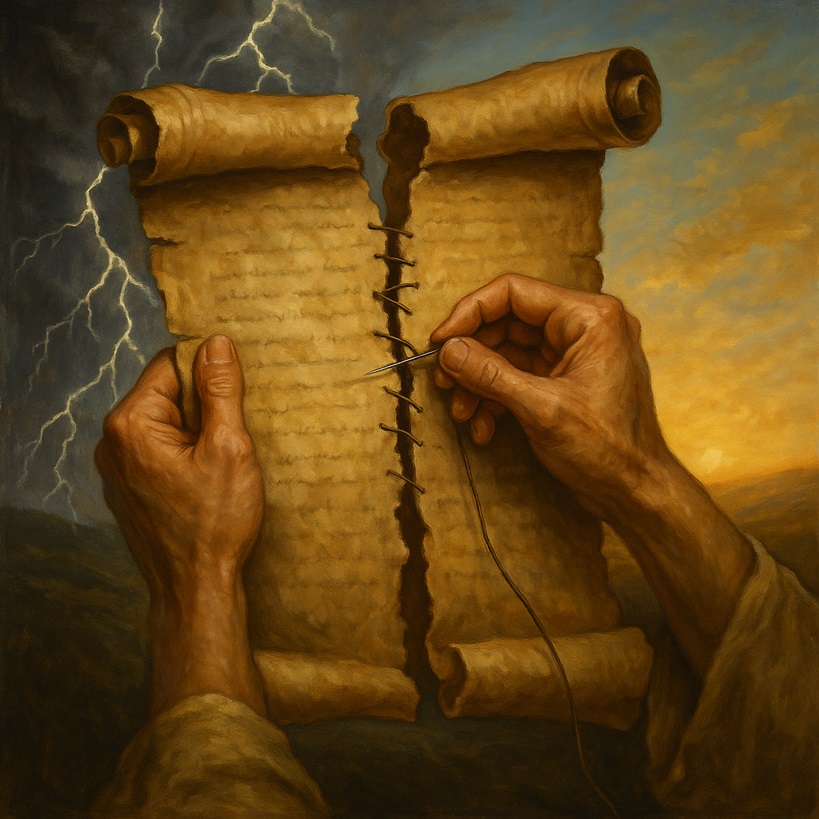
In the second century, one of the earliest and most dangerous heresies in Church history took root. It was not a denial of Jesus’s divinity, nor was it a misunderstanding of the resurrection. It was something far more subtle and insidious. Marcionism was an attempt to rewrite the very character of God by separating Jesus from the Old Testament and cutting Christianity off from its roots in Israel. This false teaching did not come from paganism. It came from within the Church, and it forced early believers to clarify what they believed about Scripture, salvation, and the God they worshiped.
Marcion’s Vision of Two Gods
Marcion of Sinope arrived in Rome around 140 AD. He was wealthy, persuasive, and deeply disturbed by what he saw as contradictions between the God of the Old Testament and the teachings of Jesus. In his view, the God of the Hebrew Scriptures was harsh, legalistic, and obsessed with justice and wrath. By contrast, Jesus preached love, forgiveness, and grace. Marcion could not reconcile these two visions. His solution was to claim that the God of the Old Testament was a different being entirely from the Father of Jesus Christ.
In Marcion’s theology, the Old Testament God was a lesser deity, a creator god who imprisoned people under law and punishment. Jesus, sent by a higher god of pure love, came to rescue humanity from this legalistic tyrant. As a result, Marcion rejected the entire Old Testament and attempted to create a new Christian canon. He kept only an edited version of the Gospel of Luke and ten of Paul’s letters, removing any reference to the Hebrew Scriptures or to Jesus fulfilling the Law and the Prophets.
This was not just a matter of preference. It was a full rejection of the Jewish roots of the Christian faith, and with it, a rejection of the unity of God’s revelation. It fractured the biblical story into competing narratives and turned Jesus into a stranger to Israel rather than her promised Messiah.
The Church Responds
The early Church recognized that Marcionism was not a minor mistake but a full-blown heresy. Church Fathers like Tertullian, Irenaeus, and Justin Martyr wrote extensive refutations. They understood that Marcion’s teachings struck at the very heart of Christianity. If Jesus was not the fulfillment of Yahweh’s promises to Israel, then the gospel had no foundation.
Tertullian famously responded in his work Against Marcion, arguing that the God of Jesus and the God of the Old Testament are one and the same. Jesus did not come to destroy the Law and the Prophets, but to fulfill them. The gospel is not a rejection of Israel’s Scriptures but their climax. The justice and mercy of God are not at odds. They are united perfectly in Christ, whose mission is unintelligible apart from the covenant story that began in Genesis.
The Church’s rejection of Marcionism also had another important consequence. It pushed early Christian leaders to define more clearly which writings were authoritative. Marcion had tried to create his own canon, so the Church responded by affirming the full body of Scripture, both Old and New Testaments. The process of canonization did not begin with Constantine or centuries of debate. It was driven, in part, by the need to defend the faith from distortions like Marcionism and protect the integrity of the gospel message.
Jesus Is Not a New God
At the core of Marcion’s error was a failure to understand who Jesus is. Jesus is not a new god with a different character than Yahweh. He is Yahweh in the flesh. Every act of grace and healing in the gospels reflects the same God who rescued Israel from Egypt, gave the Law at Sinai, and promised restoration through the prophets. Jesus did not come to save us from the Old Testament God. He came as the embodiment of that God’s covenant love.
When Jesus calmed the sea, He acted like the storm-tamer of Psalm 107. When He fed the multitudes, He echoed the provision of manna in the wilderness. When He declared the year of the Lord’s favor, He was announcing the arrival of Jubilee, rooted in Leviticus. The New Testament makes sense only when read as the fulfillment of the Old.
This does not mean that the Father and the Son are the same person. Christianity affirms the Trinity, meaning there is one God who exists in three persons: Father, Son, and Holy Spirit. When we say that Jesus is Yahweh, we are affirming that He shares in the same divine identity and essence, not that He replaces or is identical to the Father. The New Testament presents Jesus as distinct from the Father while also fully and truly God, working in perfect unity with Him.
Paul, whom Marcion admired, did not reject the Old Testament. He quoted it constantly. He called the Law holy, righteous, and good. He described the Scriptures as pointing to Christ. When he wrote that all Scripture is God-breathed, he was speaking about what we call the Old Testament. Paul’s gospel was not detached from the Hebrew Bible. It was built on it, saturated with its symbols, promises, and patterns.
The Old Heresy in New Clothes
Although Marcion was eventually excommunicated and his teachings denounced, his ideas never fully disappeared. They have resurfaced in every generation under new names and new justifications.
Whenever a preacher says that the Old Testament no longer matters, Marcionism is speaking again. When someone claims the God of the Old Testament was cruel but Jesus is kind, that is the same heresy in softer tones. When Christians speak as if Israel was completely replaced by the Church and God’s promises to the Jewish people are obsolete, they echo Marcion’s contempt for the Scriptures Jesus Himself read, taught, and fulfilled.
Some modern pastors have openly stated that Christians need to “unhitch” their faith from the Old Testament. They may mean well, often trying to make the faith more accessible, but the result is a gospel with no roots, a Jesus with no backstory, and a Christianity that forgets who Yahweh is. It is not a small shift in emphasis. It is a return to a condemned error.
The Danger of Disconnection
What made Marcionism so dangerous was that it offered a version of Christianity that seemed easier to accept. No wrath. No judgment. But in severing Jesus from Yahweh, Marcion also severed Jesus from His mission, His identity, and His authority. A Jesus who is not Yahweh cannot save. A gospel without the Law and the Prophets is no gospel at all.
The biblical story begins in Genesis, not Matthew. The covenant made with Abraham is the foundation of the promise fulfilled in Christ. The God who speaks from the burning bush is the same One who says, “Before Abraham was, I am.” To follow Jesus is to follow the God of Israel. To know Christ is to know Yahweh.
We must never pit one part of the Bible against another. The story is one. The Author is one. And He does not change.
Conclusion
Marcionism was not just a theological mistake. It was a direct challenge to the identity of God, the authority of Scripture, and the unity of the gospel. By trying to divide Jesus from Yahweh, it created a false Christ and a false message of salvation. The early Church rightly recognized it as heresy, and its legacy serves as a warning for every generation.
The temptation to simplify Christianity by cutting ties with the Old Testament still exists today. But a faith without roots will wither. The God of Israel is the God revealed in Jesus Christ. The Law, the Prophets, and the Writings all point to Him. Rejecting them means rejecting the very story that gives the gospel its meaning.
If we want to proclaim the true Jesus, we must know the God who spoke at Sinai, who walked with Abraham, who judged Pharaoh, who promised a new covenant, and who came in the flesh to fulfill every word He had spoken. The Church cannot afford to forget that Jesus is Yahweh. Marcionism was wrong then, and its modern echoes are just as dangerous now.
Discussion Questions
- What parts of the Old Testament did Marcion believe were incompatible with Jesus, and how did the early Church respond to that claim?
- Why is it essential to understand Jesus as Yahweh in the flesh rather than a new or separate divine figure?
- What dangers arise when churches ignore, minimize, or detach from the Old Testament?
- Can you identify modern teachings that unintentionally echo Marcion’s ideas, even if they use different language?
- How does viewing the Bible as one continuous story shape the way we understand the gospel and the mission of Jesus?
Want to Know More?
- Tertullian, Against Marcion
A direct and thorough response from one of the most important Church Fathers. Tertullian defends the unity of Scripture and dismantles Marcion’s two-god theory using logic, Scripture, and theology from the early Church. - Irenaeus, Against Heresies
Although primarily addressing Gnosticism, this work includes key rebuttals to Marcionite ideas. Irenaeus emphasizes that Jesus fulfills, not replaces, the promises made to Israel. - Michael J. Kruger, Canon Revisited: Establishing the Origins and Authority of the New Testament Books
Explains how and why the early Church recognized which books belonged in the New Testament and exposes how heresies like Marcionism helped push the Church to clarify the canon. - Stephen G. Dempster, Dominion and Dynasty: A Theology of the Hebrew Bible
Traces the story of Scripture from Genesis to the prophets, showing how it forms one unified narrative leading to Jesus. A powerful answer to anyone who tries to separate the Testaments. - R. C. Sproul, Knowing Scripture
An accessible introduction to reading the Bible as a whole. Helps Christians understand the continuity between the Old and New Testaments and why every part of Scripture matters.




